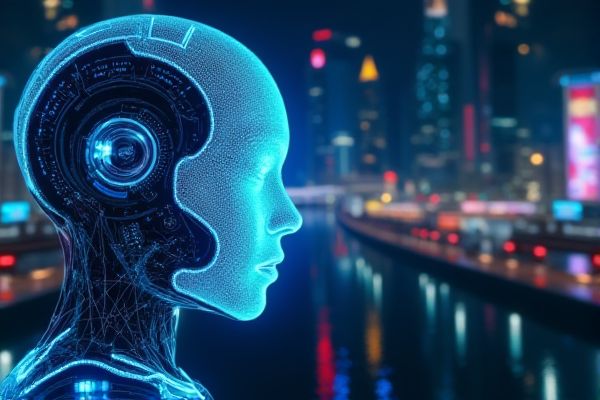
AI streamlines content creation by generating scripts, suggesting plotlines, and even composing music, significantly reducing production time. Personalized content recommendations enhance viewer engagement, as algorithms analyze user preferences to suggest films and shows tailored to individual tastes. In visual effects, AI algorithms enhance realism, automate labor-intensive tasks, and assist in creating complex environments. Moreover, AI-driven analytics provide insights into audience behavior, helping producers make informed decisions about marketing and distribution strategies.
AI usage in entertainment industry
Personalized Content Recommendations
AI can enhance the entertainment industry through personalized content recommendations that cater to individual preferences. Platforms like Netflix utilize algorithms to analyze viewing habits, thereby increasing user engagement and satisfaction. The possibility of generating curated experiences based on data insights can lead to higher subscription retention rates. Customized suggestions not only improve user experience but also potentially boost revenue for streaming services.
Virtual and Augmented Reality Enhancements
AI integration in the entertainment industry can create immersive experiences through virtual and augmented reality. For instance, game developers can utilize AI-driven algorithms to generate dynamic environments, enhancing player engagement. This technology may also streamline content creation, allowing filmmakers to visualize scenes more efficiently. Such advancements present a chance for institutions like the Academy of Motion Picture Arts and Sciences to revolutionize storytelling methods and audience interaction.
AI-Generated Scripts and Storylines
AI-generated scripts and storylines can enhance creativity in the entertainment industry, enabling writers to explore unique narrative possibilities. For example, studios like Warner Bros. are experimenting with AI tools to create engaging content tailored to audience preferences. This technology can analyze vast amounts of data to identify trends and themes that resonate with viewers. As a result, the potential for increased viewer engagement and satisfaction in films and television shows becomes more viable.
Audience Sentiment Analysis
AI can significantly enhance the entertainment industry by analyzing audience sentiment to gauge reactions to films, shows, and music. Through tools like social media monitoring, production companies can derive insights that inform marketing strategies and content creation. For example, a studio might analyze viewer feedback from platforms like Twitter to refine a movie's promotional campaign. This data-driven approach increases the chances of aligning future projects with audience preferences, ultimately improving engagement and profitability.
Real-time Digital Animation and CGI
AI has the potential to revolutionize the entertainment industry by enhancing real-time digital animation and CGI. For example, studios like Pixar could leverage AI to streamline animation processes, allowing for quicker iteration and more complex scenes. Machine learning models can analyze vast amounts of data to predict audience preferences, which can inform content creation. This technology may also improve visual effects, creating more immersive experiences for viewers in films and video games.
Voice Synthesis and Deepfake Technology
AI usage in the entertainment industry is expanding, particularly with voice synthesis and deepfake technology. Voice synthesis can enhance character development in films and video games, allowing for more dynamic storytelling. For example, studios like Disney can use deepfake technology to recreate performances of actors who have passed away, creating new opportunities for storytelling. The potential advantages include cost savings in production and the possibility of reviving beloved characters in innovative ways.
Enhanced User Interactivity and Experiences
AI in the entertainment industry has the potential to enhance user interactivity and experiences significantly. For instance, streaming platforms like Netflix use algorithms to personalize content recommendations, increasing viewer engagement. This technology allows creators to analyze audience preferences and tailor experiences accordingly. These advancements may lead to new forms of storytelling and interactive media that resonate more deeply with audiences.
Automated Content Editing and Post-Production
AI can streamline the automated content editing process in the entertainment industry, potentially reducing production time significantly. For instance, tools developed by companies like Adobe now use AI algorithms to assist in video editing, which can enhance efficiency and creativity. This technology allows editors to focus more on artistic judgment rather than manual tasks, possibly leading to higher quality outcomes. As a result, productions may see a chance for reduced costs while increasing the volume of content created.
Data-Driven Marketing and Audience Insights
AI can significantly enhance audience engagement in the entertainment industry by providing data-driven marketing strategies. For example, platforms like Netflix utilize AI algorithms to analyze viewer preferences, allowing for personalized content recommendations. This tailored approach can lead to increased viewer retention and satisfaction, capitalizing on user data to optimize content offerings. Overall, leveraging AI in this domain may create opportunities for greater audience insights and targeted marketing efforts.
Music Composition and Audio Effects Generation
AI can significantly enhance the music composition process by analyzing patterns and generating new melodies, offering composers innovative tools for creativity. For instance, platforms like AIVA allow musicians to collaborate with AI to create unique soundtracks efficiently. Audio effects generation can be streamlined with AI algorithms that adapt to different genres, ensuring a tailored listening experience. This technology presents artists with opportunities to explore diverse musical styles and produce high-quality audio with less manual effort.
 techknowy.com
techknowy.com